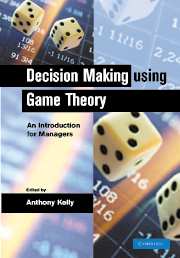Book contents
- Frontmatter
- Contents
- Preface
- 1 Introduction
- 2 Games of skill
- 3 Games of chance
- 4 Sequential decision making and cooperative games of strategy
- 5 Two-person zero-sum games of strategy
- 6 Two-person mixed-motive games of strategy
- 7 Repeated games
- 8 Multi-person games, coalitions and power
- 9 A critique of game theory
- Appendix A Proof of the minimax theorem
- Appendix B Proof of Bayes's theorem
- Bibiliography
- Index
1 - Introduction
Published online by Cambridge University Press: 02 December 2009
- Frontmatter
- Contents
- Preface
- 1 Introduction
- 2 Games of skill
- 3 Games of chance
- 4 Sequential decision making and cooperative games of strategy
- 5 Two-person zero-sum games of strategy
- 6 Two-person mixed-motive games of strategy
- 7 Repeated games
- 8 Multi-person games, coalitions and power
- 9 A critique of game theory
- Appendix A Proof of the minimax theorem
- Appendix B Proof of Bayes's theorem
- Bibiliography
- Index
Summary
Man is a gaming animal. He must always be trying to get the better in something or other.
Charles Lamb 1775–1834 ‘Essays of Elia’Game theory is the theory of independent and interdependent decision making. It is concerned with decision making in organisations where the outcome depends on the decisions of two or more autonomous players, one of which may be nature itself, and where no single decision maker has full control over the outcomes. Obviously, games like chess and bridge fall within the ambit of game theory, but so do many other social situations which are not commonly regarded as games in the everyday sense of the word.
Classical models fail to deal with interdependent decision making because they treat players as inanimate subjects. They are cause and effect models that neglect the fact that people make decisions that are consciously influenced by what others decide. A game theory model, on the other hand, is constructed around the strategic choices available to players, where the preferred outcomes are clearly defined and known.
Consider the following situation. Two cyclists are going in opposite directions along a narrow path. They are due to collide and it is in both their interests to avoid such a collision. Each has three strategies: move to the right; move to the left; or maintain direction. Obviously, the outcome depends on the decisions of both cyclists and their interests coincide exactly. This is a fully cooperative game and the players need to signal their intentions to one other.
However, sometimes the interests of players can be completely opposed.
Information
- Type
- Chapter
- Information
- Decision Making Using Game TheoryAn Introduction for Managers, pp. 1 - 16Publisher: Cambridge University PressPrint publication year: 2003
Accessibility standard: Unknown
Why this information is here
This section outlines the accessibility features of this content - including support for screen readers, full keyboard navigation and high-contrast display options. This may not be relevant for you.Accessibility Information
- 2
- Cited by
